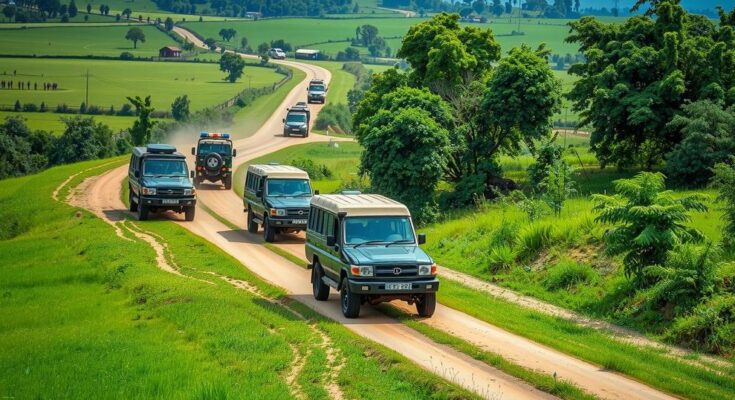Rwanda escorted Southern African troops from eastern DRC to Tanzania, responding to the phased withdrawal of SAMIDRC troops amid ongoing conflict with M23 rebels. Rwanda’s foreign minister hailed the withdrawal as a positive step in peace efforts, while troop movements continue to complicate the situation.
On Tuesday, Rwanda facilitated the departure of Southern African troops from the eastern Democratic Republic of Congo (DRC) by escorting them through its territory en route to Tanzania. This move follows the decision made by the Southern African Development Community (SADC) to discontinue the mandate of its military mission—known as SAMIDRC—aimed at assisting the Congolese government amid escalating violence from rebel groups. The SADC, comprising 16 member states, announced the phased withdrawal earlier this month.
The SAMIDRC mission, initiated in December 2023, was intended to bolster Kinshasa’s efforts against rebel factions in Congo’s troubled eastern region. However, Rwanda’s government raised concerns, asserting that such military deployment would exacerbate the ongoing conflict in that area. Rwandan Foreign Minister Olivier Nduhungirehe expressed optimism about the withdrawal, stating, “The presence of SAMIDRC troops was always a complicating factor in the conflict, and today’s start of withdrawal marks a positive step in support of the ongoing peace process.”
As part of this operation, several hundred troops reportedly sought refuge in United Nations peacekeeping bases after the fall of Goma—eastern Congo’s largest city—to Rwandan-backed M23 rebels earlier this year. Rwanda’s army spokesperson, Ronald Rwivanga, confirmed that a segment of these troops departed on Tuesday, expecting to arrive in Tanzania within hours.
Witnesses observed a convoy of approximately 20 vehicles, escorted by Rwandan military personnel, crossing into the town of Gisenyi in Rwanda. The convoy appeared to carry military equipment along with soldiers from Tanzania and South Africa. An ambulance marked with SAMIDRC insignia was also part of the group, and drivers reportedly informed bystanders that the vehicles were bound for Tanzania.
A source linked to the M23 claimed that only about half of the SAMIDRC troops stationed in Goma actually left on Tuesday, suggesting that the remaining forces would follow at a later date. The M23 continues its advance, having captured major urban areas since January, further intensifying a long-standing conflict fueled by historical grievances and struggles over the DRC’s rich mineral deposits. This unrest has resulted in thousands of deaths and forced a significant number of civilians to flee their homes.
Rwanda has consistently denied accusations from the United Nations regarding its support of the M23, asserting that its military actions are purely defensive against threats posed by the Congolese army and allied militias. In March 2024, Rwanda requested support from the African Union and other partners to cease backing for SAMIDRC, accusing the force of collaborating with factions connected to the genocide that took place in Rwanda in 1994.
Efforts at mediation have been attempted, particularly by Angola and Qatar, but thus far, these initiatives have not succeeded in bringing a resolution to the conflict. Nevertheless, there is a commitment from both the DRC and Rwanda to establish a draft peace agreement by May 2—an accord formalized during discussions in Washington last Friday.
In summary, Rwanda’s escort of Southern African troops to Tanzania marks a key moment in the ongoing conflict in eastern DRC. The withdrawal of the SAMIDRC, attributed to concerns over local tensions, reflects a shifting dynamic in the region. Despite mediation efforts, the M23 rebels continue to assert control over significant territories, complicating the peace process as both Rwanda and the DRC strive to negotiate a future resolution by early May.
Original Source: www.marketscreener.com




